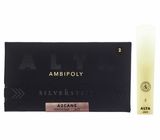

Une erreur est malheureusement survenue, veuillez réessayer ultérieurement svp.
D
The Holy Grail
Different people react very differently to reeds and I can only speak for myself - an intermediate level player. Since starting to play sax 5 or 6 years ago I have found natural reeds consistently infuriating - the likelihood that 2 or 3 out of any box will be difficult or impossible to play, the variation between reeds that are supposed to be the same cut and strength, the fragility of the tip, the short life span, the time spent tinkering and filing. There is also the issue of keeping them moist but not wet while free from mould. Did I mention breaking them in?
Then there are synthetic reeds - much less fragile, a good bit more consistent, longer lasting, no great need to play around breaking them in or scraping them flat - but, for me at least the sound is very, very limited - (the one thing that natural wood offers is a rich sound) - and the feel in the mouth of polypropylene is (to me anyway) unattractive. On top of that they can be slippery and hard to keep in place on the table of the mouthpiece to the extent of being unworkable with some ligs.
So, rant over, this is where the Silverstein Ambipoly reeds come in. To my ear they sound about 90- 95% as good as the natural reed - but given that perhaps 40% of natural reeds don't play well out of the box, that is a very good percentage indeed. Unlike the synthetic reeds I have tried, the sound is rich and altissimo is not a problem . Unlike natural reeds they're not going to squeak if you haven't scraped or wetted them enough. You do need to wet the Silverstein synthetic reeds a little bit before the first playing but then they adapt to the mouthpiece and lig and you're in business after 20 minutes or so.They also have enough friction to stay in place on the mouthpiece and they feel pleasant in the mouth. They don't dry out or get wetter - no special storage required.
The obvious issue is of course the price - just one reed for €40 (+Thomann's very special postage rates!). Perhaps 8 to 10 times the cost of a good professional natural reed. Well, in my opinion, they're well worth it - how many boxes of natural reeds would you have to buy to get the time and consistency of one of these?. I've no doubt they'll last at least as long as other synthetics, they seem to be very consistent and the sound is all I could want at my present standard of playing.
I can only see two drawbacks, which are shared with the other synthetics : 1/ as they don't absorb moisture it is easy for little drops of spit to settle on the reed or inner surface of the mouthpiece - producing a buzzy, unpleasant sound. This isn't a deal breaker - there are workarounds - you just need to be conscious of it. 2/ It's a pity for the environment that they have to be plastic - I wonder would Silverstein recycle them when they eventually wear out?
Then there are synthetic reeds - much less fragile, a good bit more consistent, longer lasting, no great need to play around breaking them in or scraping them flat - but, for me at least the sound is very, very limited - (the one thing that natural wood offers is a rich sound) - and the feel in the mouth of polypropylene is (to me anyway) unattractive. On top of that they can be slippery and hard to keep in place on the table of the mouthpiece to the extent of being unworkable with some ligs.
So, rant over, this is where the Silverstein Ambipoly reeds come in. To my ear they sound about 90- 95% as good as the natural reed - but given that perhaps 40% of natural reeds don't play well out of the box, that is a very good percentage indeed. Unlike the synthetic reeds I have tried, the sound is rich and altissimo is not a problem . Unlike natural reeds they're not going to squeak if you haven't scraped or wetted them enough. You do need to wet the Silverstein synthetic reeds a little bit before the first playing but then they adapt to the mouthpiece and lig and you're in business after 20 minutes or so.They also have enough friction to stay in place on the mouthpiece and they feel pleasant in the mouth. They don't dry out or get wetter - no special storage required.
The obvious issue is of course the price - just one reed for €40 (+Thomann's very special postage rates!). Perhaps 8 to 10 times the cost of a good professional natural reed. Well, in my opinion, they're well worth it - how many boxes of natural reeds would you have to buy to get the time and consistency of one of these?. I've no doubt they'll last at least as long as other synthetics, they seem to be very consistent and the sound is all I could want at my present standard of playing.
I can only see two drawbacks, which are shared with the other synthetics : 1/ as they don't absorb moisture it is easy for little drops of spit to settle on the reed or inner surface of the mouthpiece - producing a buzzy, unpleasant sound. This isn't a deal breaker - there are workarounds - you just need to be conscious of it. 2/ It's a pity for the environment that they have to be plastic - I wonder would Silverstein recycle them when they eventually wear out?
1
0
Signaler l'évaluation






